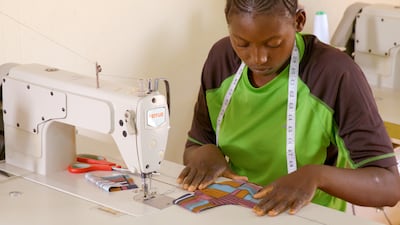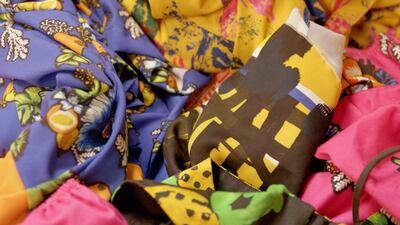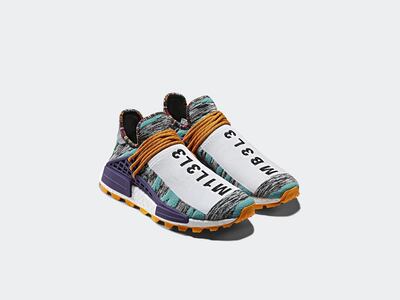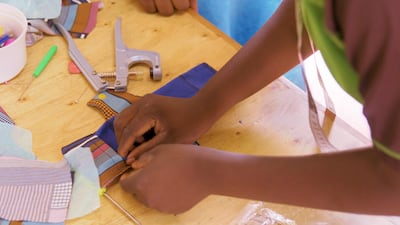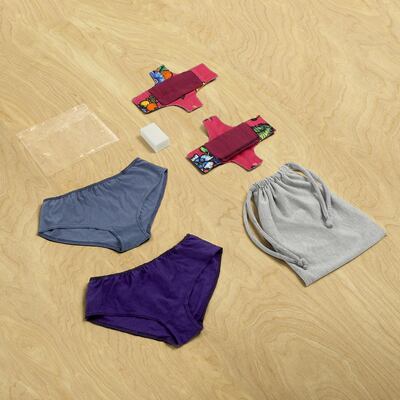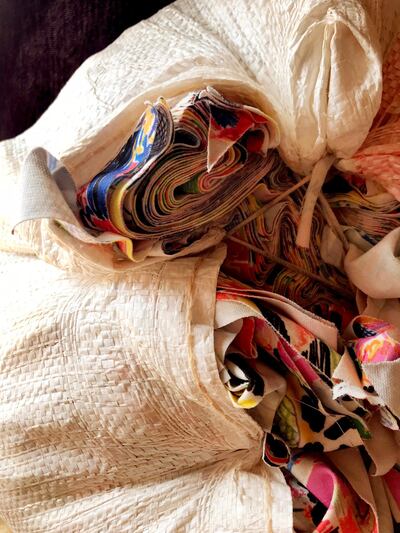The West has never been shy about recycling Africa's cultural heritage. The Cubism art movement of the early 1900s, for example, bears an uncanny resemblance to West African sculpture, while the Benin Bronzes that now fill European museums are originally from the Kingdom of Benin (in what is now Nigeria).
The casual plundering of the ideas and artworks of African nations has gone on for aeons. However, considering this is a continent of 54 countries, with a land mass of 30 million square kilometres, this cultural cross-pollination between Africa and the rest of the world was perhaps inevitable. After all, trade routes have served to spread new ideas and innovations for hundreds of years.
Much of that pilfering could be deemed flattering, too, such as when Yves Saint Laurent declared it was the bustling streets of Marrakech that taught him about colour, or when Picasso and Braque first gazed on Fang masks from Gabon, which forever altered their use of proportion.
Other theft, however, is less easy to stomach, such as the bleak cruelty of the slave trade, which saw an estimated 23.5 million people ripped from their families, or the display of children as exhibits in European human zoos until the 1950s.
While redressing such acts of inhumanity is probably impossible, paying reparations for borrowed concepts is a little easier. Thankfully, there are people who are trying to relevel the balance, and give credit where it is due.
One such person is Haitian-Italian designer Stella Jean, who leans on her Creole heritage as inspiration for her collections. Her eponymous label was launched in 2011; two years later, it was taken under the wing of Giorgio Armani. That same year, Stella Jean partnered with the Ethical Fashion Initiative to incorporate heritage African fabrics – including traditional mudcloth from Mali – to ensure that these arts survive and their makers receive financial support. Keen to help small, struggling communities become self-sustaining, the label has grown to become a celebration of Haitian and Malian artisans.
Meanwhile, for the latest release of his long-standing collaboration with Adidas, music mogul Pharrell Williams unveiled the Solar Hu trainers, as an homage to Tanzania, Kenya and Burundi, as Williams is keen to showcase the unique craftsmanship of the tribes in these communities. The running shoes are emblazoned with Swahili words milele ("forever") and mbele ("forward"), and the tennis version comes in vibrant pinks and blues with a distinctive finish reminiscent of traditional weaving.
While it's not unusual for individual celebrities to align themselves with a cause that is close to their heart or their roots, an unlikely champion of Kenyan textiles is online fashion store Asos. Founded in 2000, and aimed at the 20-something market, Asos has 16.5 million customers, 20 million social-media followers and adds 5,500 items a week to its vast website.
With a turnover of £1.9 billion (Dh8.99bn) last year, the brand has established the Asos Foundation, which works under the banner of "fashion with integrity" and helps disadvantaged young people across the India, Kenya and the United Kingdom. In Britain, it works with charities such as the Prince's Trust and LightHouse, while in Kenya it helps The Kujuwa Initiative.
Based in the Kasigau region of rural Kenya (about 180 kilometres from Mombasa), Kujuwa was set up after discussions with local women revealed that in an area that has dire levels of poverty, girls were skipping school each month. When asked why, it was discovered that with no access to affordable sanitary products, girls were reluctant to stray far from home when they were menstruating.
Although such products are priced at the equivalent of about Dh2, this still amounts to two days' wages in the region. So despite most girls working outside of school hours, access to clean sanitary towels is beyond the reach of most, who are instead forced to make do using rags, newspaper or even mud, risking infection.
Many schools also often lack basic amenities, such as running water and even doors on toilets, making the simple matter of changing used sanitary pads a humiliating struggle. With periods already steeped in stigma within Kenyan society, the girls would rather jeopardise their precious education than risk public shaming.
The Global Partnership for Education has concluded that the education of girls is a key factor in reducing and preventing poverty, with multiple studies proving that educated girls go on to have fewer children and are better equipped to look after relatives and dependents. In 1989, the United Nations declared access to education to be a fundamental human right. Despite this, in 2014 – the most recent year for which figures are available – it was estimated that more than 250 million children of school age around the world were unable to read or write.
With a literacy rate of 78 per cent, Kenya looks to be one of the success stories, yet this figure is actually a drop from a 2000 high of 82.2 per cent. To halt this backward slide, it is critical that all children – not just boys – attend school.
The choice to focus on Kenya is not accidental. In 2009, Asos launched the Made in Kenya capsule collection, made from colourful and brightly patterned kanga or leso cloth, for which it approached Soko Kenya, a small factory in the Rukinga Wildlife Sanctuary. The resulting fashion line proved so popular with Asos shoppers that it is now in its ninth year.
Michelle Obama is said to be a fan.
Soko Kenya was founded in 2009 by Joanna Maiden, and aims to offer the fashion industry a manufacturing partner in a region that is rife with unemployment, poverty and HIV/Aids. By providing wages, a safe work environment and subsidised healthcare, Soko is hoping to bring self-sustainability to the region. Aware that too few people had the skills needed to work in the factory, it set up the Stitching Academy Hub to train workers how to sew, with the offer of employment after graduation.
When they were working together on the fashion line, Soko Kenya and the Asos Foundation realised that combining forces would have a greater impact on the region and, in 2016, Kujuwa (meaning "knowledge") was born. Conscious of the bags of fabric offcuts produced by the clothing line, The Kujuwa Initiative was set up to find a practical solution for a very intimate problem. Now, in an elegantly simple use of logic, those colourful scraps are made into reusable sanitary towels, which are then handed to local girls, and allowing them to attend school.
The pads, which are made from 100 per cent cotton, are practical, durable, hygienic, and totally washable and reusable. The removable inner layer even unfolds into a simple square for the sake of discretion. The towels are one component of a Kit (Keep It Together) bag, which contains three pairs of underwear, two sanitary pads, two liners, a bar of soap and a waterproof wash bag. So far, 900 Kit bags have been handed out.
As a next step, The Kujuwa Initiative has begun to work with schools to improve their levels of hygiene and privacy. To date, six schools have received new water tanks and toilets.
The pads and bags themselves are manufactured by the Stitching Academy – which has ample access to scraps from its fashion line – providing much-needed income to the trainees working there, too. Another knock-on effect is that by being reused, the bags of fabric are no longer being dumped in landfill, reducing pollution and waste.
With so much noise being made about closed-loop economies, circular manufacturing and corporate social responsibility, it is encouraging to see two companies joining forces to help enable real change, which will undoubtedly make lives in Kasigau a little easier.
It is also heartening to see such a show of support from a fast-fashion supplier, because this sector is normally derided as being the nemesis of sustainability. For online retail to be so active in trying to redress problems may be surprising, but it's even more surprising that so few others in fashion can say the same.
_________________________
Read more:
Beyoncé helps to lift up small, ethical Egyptian fashion label
Spanish label Loewe partners with model Doutzen Kroes to Save the Elephants
Madiyah Al Sharqi and The Modist mark Emirati Women’s Day
__________________________
